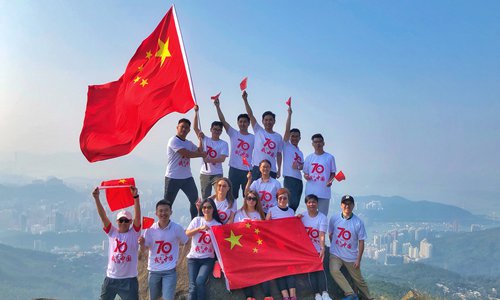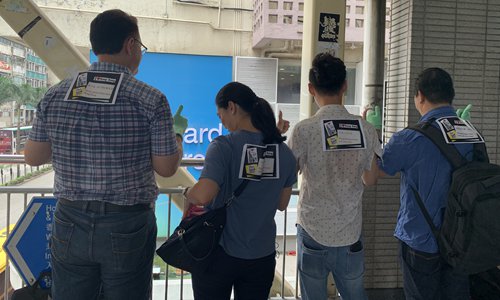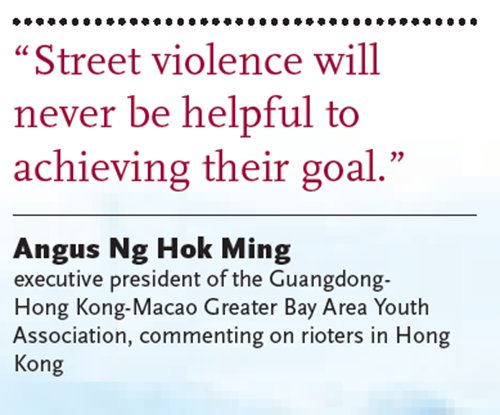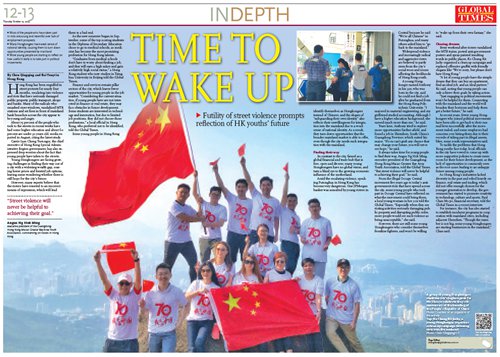HOME >> CHINA
Futility of street violence prompts reflection of HK youths' future
By Chen Qingqing and Bai Yunyi in Hong Kong Source:Global Times Published: 2019/10/9 18:46:11

A group of young Hongkongers climb the city's highest peak Tai Mo Shan to celebrate the 70th anniversary of the founding of the People's Republic of China. Photo: Courtesy of an organizer of the activity
○ Most of the people who have taken part in riots are young and resentful over lack of employment prospects
○ Many Hongkongers have weak sense of national identity, causing them to turn down opportunities presented by mainland
○ More young people are starting to reflect on how useful it really is to take part in political movements
Hong Kong has been engulfed in street protests for nearly four months, escalating into violence and riots that have seriously damaged public property, public transport, shops and banks. Many of the radicals who smashed store windows, vandalized MTR stations and set fires in front of mainland bank branches across the city appear to be young and angry.
About 75 percent of the people who took to the streets in recent weeks have had some higher education and about 60 percent are under 30 years old, media reported in August, citing the latest study.
Carrie Lam Cheng Yuet-ngor, the chief executive of Hong Kong Special Administrative Region government, has also expressed deep worries about the fact that young people have taken to the streets.
Young Hongkongers are facing growing challenges in finding their way out of a city with a widening wealth gap, soaring home prices and limited job options, leaving some wondering whether there is still hope for the city's future.
However, many experts believe that the rioters have resorted to an incorrect means of expression, which will lead them to a bad end.
As the new semester began in September, some of the top scoring students in the Diploma of Secondary Education chose to go to medical schools, as medicine has become the most promising profession for Hong Kong talents.
"Graduates from medical schools don't have to worry about finding a job, and they will earn a high salary and gain a relatively high social status," a Hong Kong student who now studies in Tsinghua University in Beijing told the Global Times.
Finance and services remain pillar sectors of the city, which leaves fewer opportunities for young people in the job market. "Considering the current situation, if young people here are not interested in finance or real estate, they may face obstacles in future development. Some students are interested in technology and innovation, but due to limited job positions, they did not choose those professions," a local official in Hong Kong, who preferred not to be identified, told the Global Times.
Some young people in Hong Kong identify themselves as Hongkongers instead of Chinese, and the slogan of "safeguarding their own identity" also reflects their unwillingness for integration into the mainland due to a weak sense of national identity. As a result, they turn down opportunities that the broader mainland market is able to offer, even though the city needs such integration with the mainland.

Ko Chung Kit Jacky, a young Hongkonger, organizes a clean-up campaign following riots over the weekend. Photo: Chen Qingqing/GT
Finding their way
In contrast to the city, famed as a global financial and trade hub that is free, open and diverse, many young Hongkongers have no global vision, and turn a blind eye to the growing economic influence of the motherland.
Amid the escalating violence, speaking Putonghua in Hong Kong has become very dangerous. One JPMorgan banker was assaulted by young rioters in Central because he said "We're all Chinese" in Putonghua, and many others asked him to "go back to the mainland."
Widespread violence and increasingly radical and aggressive views are believed to partly stem from the city's social woes and issues affecting the livelihoods of Hong Kong youth.
A young Hongkonger named Anthony in his 30s, who was born in the city, said he could not find a job after he graduated from the Hong Kong Polytechnic University. "I majored in material engineering, and my girlfriend studied accounting. Although I have a higher education background, she earned much more than me," he said.
Years later, Anthony tried to explore more opportunities further afield, and found a job in Shenzhen, South China's Guangdong Province, which suited his major. "If you can't grab any chance that may change your future, you will never see hope," he said.
It always takes time for young people to find their way, Angus Ng Hok Ming, executive president of the Guangdong-Hong Kong-Macao Greater Bay Area Youth Association, told the Global Times. "But street violence will never be helpful to achieving their goal," he said.
From the illegal Occupy Central movement five years ago to today's anti-government riots that have spread across the city, some young people who took part in Occupy Central have reflected on what the movement could bring them, a local young woman in her 20s told the Global Times. "Especially when they see rioting activities seriously damaging public property and disrupting public order, more people would see such violence as being unacceptable," she said.
However, there are still some young Hongkongers who consider themselves frontline fighters, and won't be willing to "wake up from their own fantasy," she said.

Chasing dreams
Every weekend after rioters vandalized the MTR trains, posted anti-government posters and spray-painted insulting words in public places, Ko Chung Kit Jacky organized a clean-up campaign and replaced offensive graffiti with friendly slogans like "We're sorry, but please don't hate Hong Kong."
"A lot of young people have the simple dream that they can buy an apartment, find an ideal job, and an ideal partner," Ko said, noting that young people can only achieve their goals by taking action.
"Just engaging in political movements won't be helpful for them. Connecting with the mainland and the world will broaden their horizons and help them get a better future," he said.
In recent years, fewer young Hongkongers who joined political movements have been able to get back to their normal lives successfully after the movement ended, and some employers had concerns over hiring them due to their records of taking part in illegal assemblies, some youth representatives said.
To tackle the problems that Hong Kong youths face today, local officials in the city have vowed to come up with more supportive policies to create more room for their future development, as the lack of opportunities is commonly seen as the root cause leading to an unhappy future among young people.
As Hong Kong's industries lacked diversity in the past and relied heavily on finance, real estate and trading, which did not offer enough choices for the younger generation to develop, the government has started to promote creativity in technology, culture and sports, Paul Chan Mo-po, financial secretary, told the Global Times in a recent interview.
For instance, the city has also started to establish incubator programs in cooperation with mainland cities, including adjacent Shenzhen. "Though the number is not big, some young Hongkongers are starting businesses in the mainland," Chan said.

Newspaper headline: Time to wake up